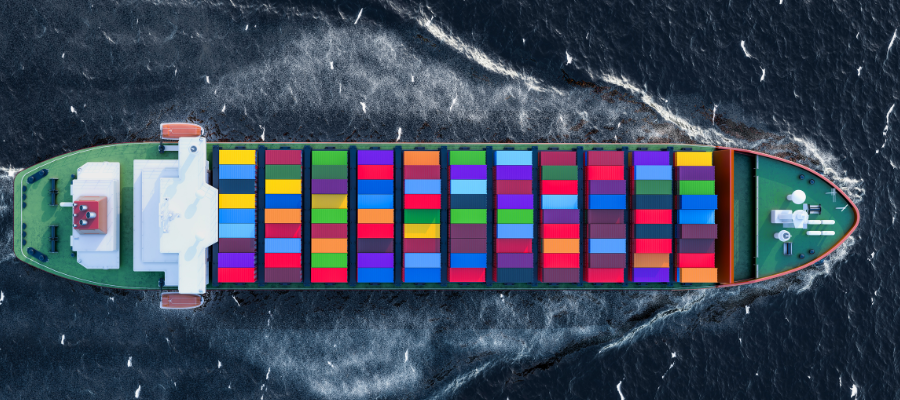🕒 Article read time: 2 minutes
Growth emerging out of volatility: ocean trends take centre stage at European summit

While global markets remain volatile, maritime transport will hold steadfast as a growth industry, according to expert speakers at a summit held in October 2023 by Xeneta, an ocean and air freight rate benchmarking and market analytics platform.
Taking place in Amsterdam, Netherlands, speakers at the summit discussed a positive growth trajectory for the ocean freight industry; why capacity management will be key in the coming years; and the ongoing challenges created by volatility of rates and the prospect of an index-pricing system as a solution.
In this article, Ellis Shelton, Policy Advisor at Logistics UK, provides expert commentary on the key topics discussed, as he shares his view on the challenges and opportunities facing ocean freight businesses and operations.
REMAINING A GROWTH INDUSTRY
“The maritime industry continues to prove itself as a robust and dynamic growth sector, defying challenges and adapting to evolving global demands,” says Shelton.
“Several factors contribute to its sustained expansion, including the increasing globalisation of trade, advancements in technology, and a growing focus on sustainable practices.
“As emerging markets continue to play a significant role in the world economy, the maritime industry stands to benefit from increased trade volumes and new trade routes,” he continues.
ENVIRONMENTAL TRANSFORMATION
Given the scale of ocean freight – 90% of global trade is moved via the sea – decarbonising the industry is vital in the fight against climate change.
“The industry is aligning itself with global efforts to combat climate change,” says Shelton.
“Heightened awareness of environmental sustainability has pushed the maritime industry to focus on reducing its emissions, developing alternative fuels, and implementing cleaner technologies.”
SUPPLY AND DEMAND: MARKET STABILITY
The importance of matching supply of shipping capacity with demand for cargo space effectively was a core point of discussion during the session at the Xeneta summit.
“Managing supply and demand is critical to both the Shipping Lines and the Shippers who use their services,” said Shelton.
“Understanding and anticipating changes in supply and demand patterns allows companies to engage in strategic planning effectively, in matters such as fleet expansion, diversification into new markets, or the adoption of innovative technologies to stay ahead of industry trends.
“Like many industries, the maritime sector is vulnerable to various risks, including economic downturns, geopolitical events, and natural disasters,” says Shelton.
INDEX-PRICING SYSTEM
The speakers at the summit discussed the ongoing challenges created by the volatility of rates and pricing systems as a solution.
“The existence of upper and lower limits in an index contributes to market confidence. It assures participants that the pricing mechanism is structured and mitigates the risk of extreme fluctuations, fostering a more stable and reliable market,” says Shelton.
“By establishing upper and lower limits in an index, both shippers and carriers can have a degree of price stability, providing the necessary assurance for both parties.
“Shippers often plan their budgets based on anticipated transportation costs. This approach would ensure shippers can have assurance that freight rates won't exceed a certain level, protecting them from unexpected cost spikes, helping them to budget effectively, and providing cost predictability.
“Having upper limits in an index helps shippers, and carriers, on the other hand, can plan their operations with confidence, knowing that rates won't drop below a certain level, ensuring a minimum level of revenue,” comments Shelton.
IN CONCLUSION
“The speakers at the summit explored some of the key issues facing the maritime sector and provided reassurance that the industry will remain on a growth trajectory in the face of ongoing global challenges.
“With ships being the lifeblood of international trade – the interconnected nature of our global economy ensures a continuous demand for maritime transportation – I have no doubt the industry will continue to flourish and seek effective, sustainable solutions to the challenges it faces, both now and in the future,” concludes Shelton.
Published On: 09/11/2023 13:00:00

Comments Section
If you are a Logistics UK member login to add comments.